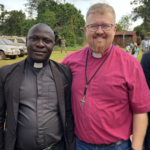
Anglican Communion – A Street View

Primatial Fury
Were you like me? Each day I found myself checking into Facebook or Virtue Online to see if I could scour any information or tidbits from meetings in Canterbury. The allure of the Anglican dilemma was intoxicating. Would the gospel prevail? Would orthodoxy be restored? Or would the trajectory of an institution in demise continue unabated?
By Thursday, an early statement was released indicating that a step forward for orthodoxy was achieved, but the disciplinary action almost seemed a minor slap on the wrist rather than a genuine step towards reform.
The intrigued of what “could” happen was enough to keep me coming back. But as the week lagged on, reality began to settle in reclaiming its stubborn position that hope of swift, substantive change in the Anglican Communion would give in to diplomatic process.
I am thankful for the Ugandan Bishop as well as the GAFCON leaders for their resolve.
Anglican Street Cred
While all of this was happening, I read an excellent blog post by Anne Kennedy “Canterbury Woe.” Her message reframed my whole perspective. Ms. Kennedy’s wit and style combined with a seasoned Anglican outlook brought me out of my social media stupor and reminded me of reality.
What stood out to me most was a paragraph that reframed the problem of being Anglican in the U.S. She writes,
I am weary. I am terribly weary. I stand here, in the frozen northeast, surrounded by people who can’t even say the word Anglican. Is that like ‘Angel’? Angelican? Maybe? And, is that like a Christian church? Or, what is that? My charismatic neighbor across the street, who is himself a pastor, assuming us, of course, not to be recognizably Christian, was shocked to hear we believe in Jesus, in the bible even. “Really?” he kept saying, “I had no idea.”
I thought the inability to say the word Anglican was a problem for us located in the American deep south. (Tongue-in-cheek)
Her point is obvious. In the U.S. being Anglican is not on most people’s minds. For those few who happened to actually pay attention to the news, the media bias will determine their outlook. Liberal media outlets will make conservatives out to be homophobic, religious bigots and liberals will be positioned as oppressed crusaders willing to forge on with their global attempt to bring Christendom into the 21st century.
As I watched from afar the 2016 Primatial gathering unfold, the events reminded me of an experience I had when I worked in the pharmaceutical industry.
Each year I attended an annual sales meeting. Top level executives from the company would take center stage and give well-rehearsed speeches. Sometimes they spoke in such broad generalities that it left me wondering how it would have any consequence on my day to day job.
After the meetings were finished, I typically thought to myself. “How is my day to day job any different?” Usually a profound silence followed by a sense of bafflement was my general response.
Organizational leadership gurus will often make the following observation: The further removed a leader is from the front lines, the less effective he or she is in making any real substantive difference. In other words, as leaders ascend in the ranks of organizations, they become less and less aware of the “day in and day out” problems confronting those working in the trenches and on the street. In other words, leaders sometimes lose sight of the day to day reality – i.e. not being able to pronounce Anglican.
Our Bigger Problem
The problem is that two entirely opposing theologies are trying to figure out a way to “work together” without arriving at the ominous conclusion that they can’t. Schism, it seems, is the greater threat.
But have we really come to grips with this conclusion? Albert Einstein quipped,
“We can not solve our problems with the same level of thinking that created them.”
Einstein’s observation helps us understand the deep challenge facing Anglicanism in North America. The Episcopal Church’s rejection of orthodoxy will probably not change unless the underlining systemic problems are addressed. A short term moratorium on “communion” will accomplish very little. History testifies that churches arrive in these situations as a result of generations of compromise and heterodoxy creeping into church structures. Genuine reform seems unlikely.
However, history also bares testimony to the course correction of a church when faithful men and women stand tall for biblical truth. Such examples readily available by looking at those brave Englishman (Lollards, Cranmer, Ridley, Latimer, and others) who paved the way for genuine reform to take place in the Church of England. Though it would take 160 years, the English church eventually corrected itself. I’m a product of their legacy.
As the word Anglican has since slipped out of the common vocabulary of our culture, perhaps we should understand this trend as an outward sign of an inward problem. Consistent general compromise of the gospel by Anglicans has led us to a point of cultural obscurity.
To keep us from despair, we should remember something about hierarchical structures. Even though Christ’s middle managers occasionally substitute His plan with that of their own, Christ Jesus is still the King of Kings.
As the 2016 Primatial Gathering fades into our memory and into church history, is there anything that we can do differently?
The answer to this question is “very little” if you think change will occur as a result of top-down hierarchical change. However, there is something gospel-centered Anglicans can do each and every day — we can pray, we can share the gospel with our neighbors, and we can stay grounded in the bible.
Simper Reformanda




